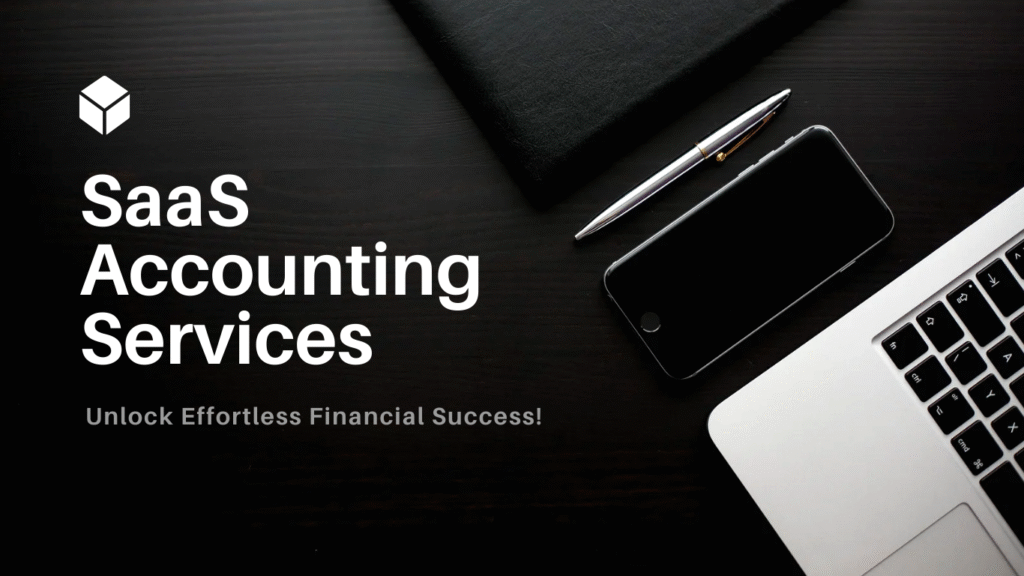
Introduction
The Software-as-a-Service (SaaS) model transformed software development and distribution through the modification of software consumption methods. While SaaS companies benefit from consistent revenue patterns and expansion possibilities, they confront intricate accounting concerns that conventional firms typically avoid. Subscription billing and deferred revenue tracking present considerable challenges for SaaS businesses as they strive to comply with changing accounting standards. This complete manual assists new SaaS startups, along with established enterprises, in identifying accounting methods that deliver sustainable success.
Essential SaaS Accounting Services Every Scalable Business Needs
Financial practices in SaaS businesses need to develop alongside company growth to preserve accuracy and compliance while upholding transparency. Subscription-based revenue requires a highly specialized accounting approach because of its unique characteristics. The core components of effective financial management within strategic decision-making include essential SaaS accounting services.
Recognizing revenue stands as one of the key aspects that businesses must focus on. SaaS companies collect payments for services which are provided across prolonged durations through monthly or yearly subscription models. Accountants need to accurately distribute revenue throughout the entire service duration. This requirement serves internal reporting needs and also supports external audits and investor relations.
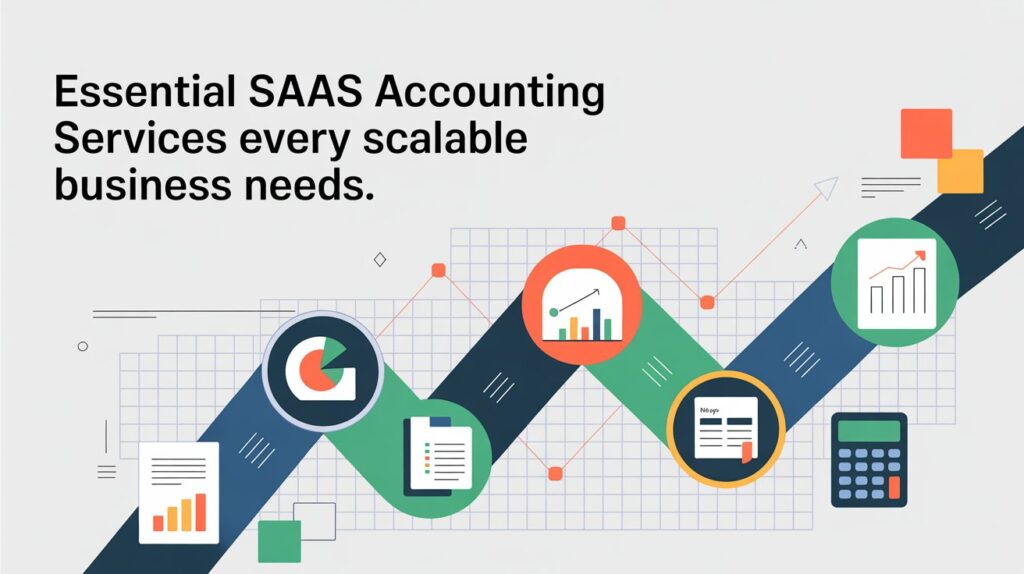
Expense categorization serves as an essential business service that allows organizations to evaluate profitability across their departments and functions. SaaS companies allocate significant budgets to both research and development and sales operations within their financial structure. Analyzing expense categories helps businesses identify improvement opportunities and achieve better resource allocation optimization.
Systems with strong capabilities maintain recurring billing operations by continuously monitoring subscription renewals as well as status changes that encompass upgrades, downgrades, and cancellations. Without an automated system, revenue forecasting becomes distorted because errors accumulate rapidly.
Statistical Insight: A SaaS CFO report shows that automated revenue recognition practices cut audit preparation time by 35% and boosted financial accuracy by 28%.
Traditional accounting systems fail to support recurring revenue models and dynamic customer interactions due to their inflexible nature. SaaS companies require advanced accounting systems that combine agility with technical expertise to remain competitive.
Mastering Accounting for SaaS Software: A Complete Breakdown
Strategic business decision-making benefits from SaaS software accounting because it delivers essential financial data beyond meeting compliance requirements. As they grow, SaaS companies need to implement standardized metrics to monitor their performance effectively. Integrating performance metrics into daily financial operations represents the primary challenge.
Business success evaluation depends on core metrics such as Monthly Recurring Revenue (MRR) and Annual Recurring Revenue (ARR). Company leaders evaluate organizational stability and forecast potential growth through financial metrics. Recurring revenue delivers stable financial forecasts that enable effective strategic planning, unlike traditional revenue sources, which experience unpredictable fluctuations.
Key Metrics Table:
| Metric | Description | Importance |
| MRR | Monthly Recurring Revenue | Measures predictable monthly income |
| ARR | Annual Recurring Revenue | Indicates long-term revenue health |
| LTV | Customer Lifetime Value | Assesses customer profitability |
| CAC | Customer Acquisition Cost | Evaluates sales and marketing efficiency |
ASC 606 creates substantial hurdles for organizations when they apply revenue recognition principles. The regulation establishes that revenue should be recognized at service delivery time rather than when payments are received. Complex revenue recognition procedures emerge for companies that deliver bundled services or utilize variable pricing strategies.
Case Study: Atlassian
To comply with ASC 606, Atlassian implemented automated systems for its software products Jira and Trello. Investor confidence grew because of the company’s precise revenue recognition tied to their delivery schedule, which led to a 15% stock price boost after earnings were disclosed.
Businesses need to understand Customer Lifetime Value (LTV) and Customer Acquisition Cost (CAC) to make essential strategic choices. A 2024 SaaSBench study found that companies with an LTV: Organizations that preserved an LTV: CAC ratio above 3:1 succeeded in achieving their profitability targets three times faster than their counterparts.
Smart Accounting for Early-Stage SaaS Startups: Avoid Costly Mistakes
Early-stage SaaS startups dedicate their efforts primarily to developing their product and acquiring customers, which is understandable. The failure to adhere to proper accounting procedures can bring about major negative outcomes in the future. The importance of financial clarity becomes apparent to founders when they begin fundraising efforts or confront regulatory examinations.
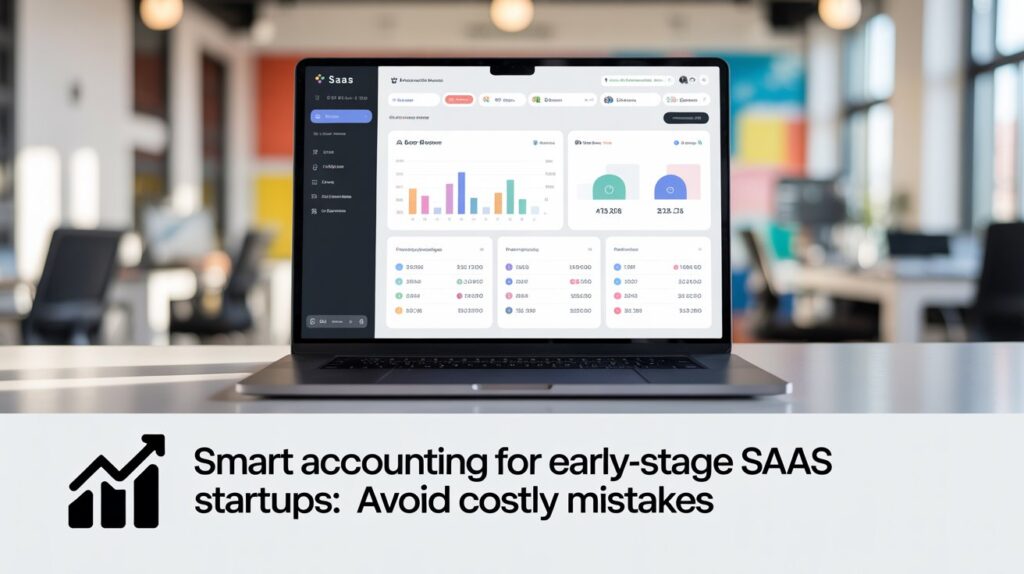
Early-stage startups often mistakenly adopt cash-based accounting methods. Although cash-based accounting appears easy to use, it fails to provide a true representation of financial status for businesses with recurring revenue systems. Accrual accounting creates a more precise financial depiction by aligning income with its corresponding expenses in their respective periods, though it requires more complex processes.
These three mistakes commonly occur among early-stage SaaS startups:
- Blurring the line between personal and business financial transactions creates difficulties during audits and tax processing.
- When businesses overlook deferred revenue obligations, they end up reporting inaccurate income levels.
- Inadequate record-keeping and irregular accounting methods discourage potential investors.
Startups need to begin preparing for potential investment rounds as soon as possible. The company needs to maintain organized books and accurate financial projections while understanding important SaaS metrics. Investors require evidence of both financial discipline and strategic foresight, along with growth, when evaluating startups.
Top-Rated Accounting Services for SaaS Companies That Drive Growth
The choice of accounting service provider plays a crucial role in shaping the growth path of a Software as a Service company. Businesses have three primary choices for accounting teams, including internal teams, CPA firms that focus on SaaS services, and external accounting partners. All available accounting solutions provide benefits, but the optimal selection will depend on both the developmental phase of the company and its distinct requirements.
In-house teams provide complete control while adapting swiftly to organizational procedures. Creating an in-house team demands substantial financial resources along with a lot of time. Subscription business-focused CPA firms with SaaS expertise provide specialized knowledge while delivering services for MRR tracking, churn analysis, and ASC 606 compliance.
Comparison Table:
| Service Model | Pros | Cons |
| In-House | Full control, quick response | Expensive, time-consuming to build |
| CPA Firm | Specialized expertise, trusted | Less flexible, higher hourly rates |
| Outsourced | Cost-effective, scalable | May require onboarding effort |
Outsourced SaaS accounting services usually provide the best balance of cost savings and operational flexibility. These services connect with accounting platforms including Xero, QuickBooks, and NetSuite, while delivering complete solutions that span payroll to financial strategy development.
Assess their SaaS expertise level and their adaptability to your technology environment, along with the accessibility of fractional CFO services for strategic direction.
Outsourced Accounting Services for SaaS Companies: A Game-Changer
By outsourcing accounting tasks, SaaS companies achieve lean operations while maintaining accurate financial records. These services extend past simple bookkeeping to deliver expert advice on revenue recognition, along with tax compliance and financial forecasting.
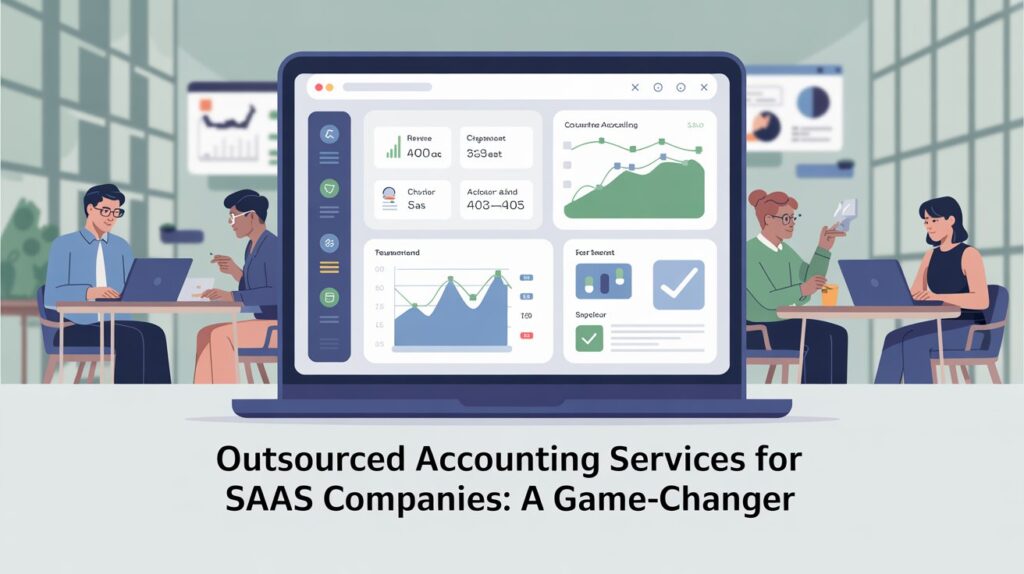
Outsourcing delivers significant scalability benefits to businesses. When a SaaS business grows, it faces higher accounting demands. During phases of rapid expansion, outsourced service providers adjust their services to match business growth, allowing seamless transitions.
Benefits of Outsourced Accounting Services:
- Cost savings (no full-time salaries or benefits)
- Access to SaaS-specialized experts
- Compliance with standards like ASC 606
According to a 2024 FinOps Insights survey, 67% of SaaS startups that used external accounting services achieved quicker audit clearances and improved financial transparency compared to those who handled accounting internally.
The appropriate accounting partner must function as an extension of your team by delivering consistent updates and proactive insights, together with data-driven advice specifically designed for SaaS business requirements.
Reliable Accounting Services for SaaS Startups: What You Should Know
SaaS startups need reliable accounting to function strategically beyond basic back-office operations. Selecting a trustworthy accounting partner at the beginning of your business journey helps to maintain orderly financial operations while building a foundation for future expansion.
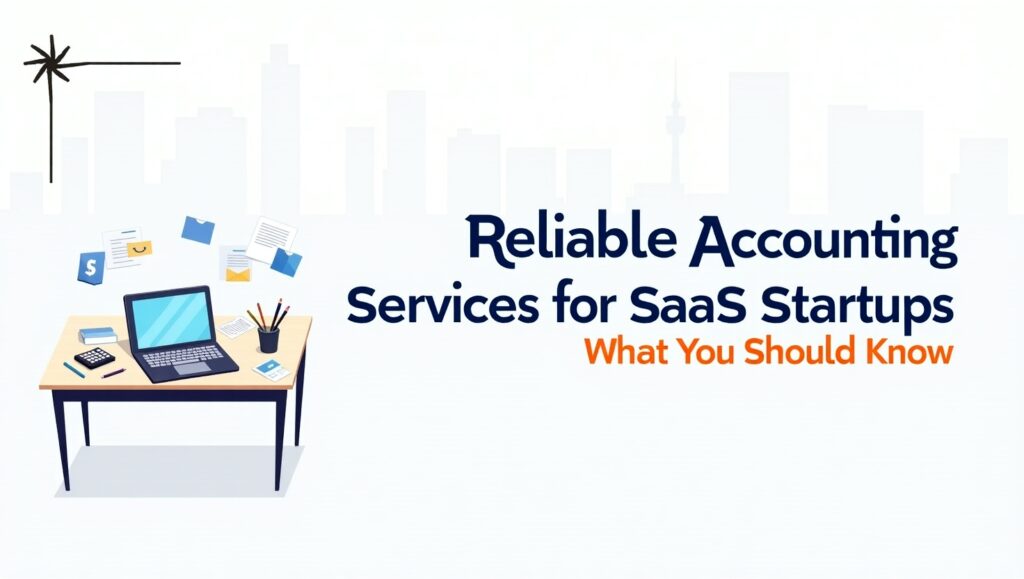
A high-quality accounting service needs to possess knowledge about the entire lifecycle of SaaS startups, beginning with pre-seed funding and continuing through Series A funding stages. They should offer scalable services such as:
- Deferred revenue tracking
- Payroll management for remote tech teams
- State and international tax compliance
Proactive financial guidance is essential. Actionable dashboards alongside investor-friendly financial statements and insightful commentary from your accounting partner will guide your business strategy effectively.
The most successful partnerships are built upon strong foundations of trust and transparency. Their analysis goes beyond simple number reporting to help drive your business strategy forward.
Sample Chart of Accounts for Service-Based SaaS Businesses (Proven Template)
The establishment of an appropriate chart of accounts (COA) forms the basis for solid financial management practices. A properly organized chart of accounts enables straightforward reporting alongside improved decision-making and compliance process simplification.
Sample COA Layout:
| Category | Accounts |
| Revenue | Subscription Revenue, Setup Fees, Service Fees |
| COGS | Hosting Fees, Support Wages, Software Licenses |
| Opex | R&D, Marketing, Admin Expenses |
Your chart of accounts must accurately mirror the distinctive structure of your business operations. Companies that utilize freemium models can benefit from monitoring marketing costs that directly relate to activating new users.
A business-specific COA enables detailed analysis, which supports financial transparency for investors.
Your Ultimate SaaS Accounting Service Guide for Streamlined Finances
A robust accounting system that goes beyond everyday tasks is essential for efficient financial streamlining. SaaS enterprises reach their best performance levels by providing full-service solutions that integrate strategic management with real-time dashboards and automated financial tools for billing and planning.
Through real-time dashboards, executives can instantly access important performance metrics, including churn rate, monthly recurring revenue, and customer acquisition cost. Executives use insights to make rapid decisions while identifying irregularities that need additional examination.
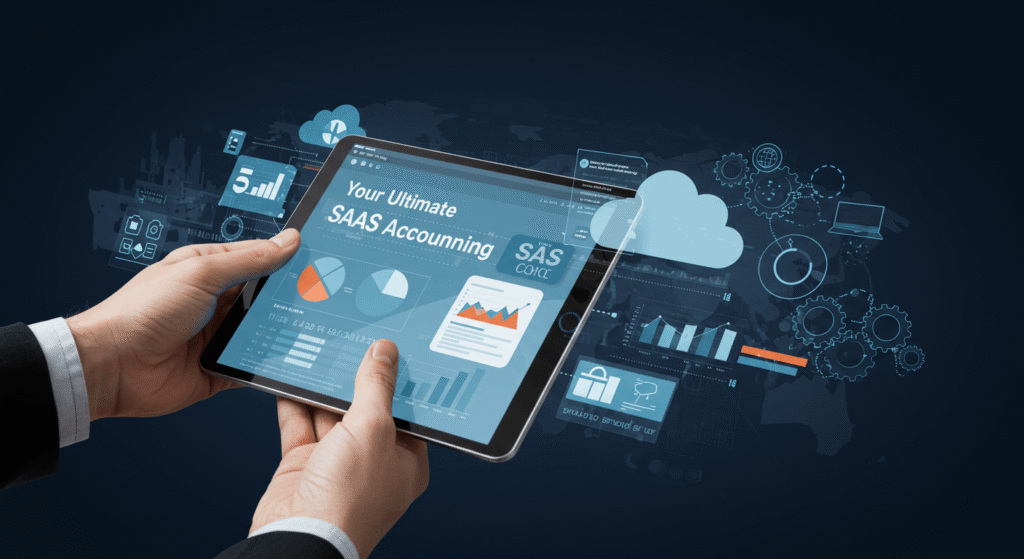
Automated billing platforms remove manual efforts from invoice creation and follow-up tasks to ensure a smoother billing process. This system helps to reduce late payments and improve cash flow management effectiveness.
Investor-ready reports and long-term forecasting tools help businesses gain advantages when preparing for funding rounds or IPOs. 2024 SaaS Capital data indicates that SaaS companies utilizing these tools increase their chances of securing Series A and B funding by 40%.
Conclusion
A proactive and knowledgeable tech-savvy approach is essential to succeed in the specialized area of SaaS accounting. Traditional accounting practices fail to effectively handle recurring revenue streams and deferred income for teams that scale quickly.
Both bootstrapped startups and enterprises approaching an IPO will achieve compliance and growth while gaining a competitive advantage through professional SaaS accounting services. Your accounting framework needs to match software innovation and agility through the customized chart of accounts and CFO-grade insights from outsourcing partners.
Immediately evaluate your existing financial structure to find areas needing improvement and adopt specialized tools and services that benefit SaaS companies. Decisions about your company’s finances today will shape its future success.

